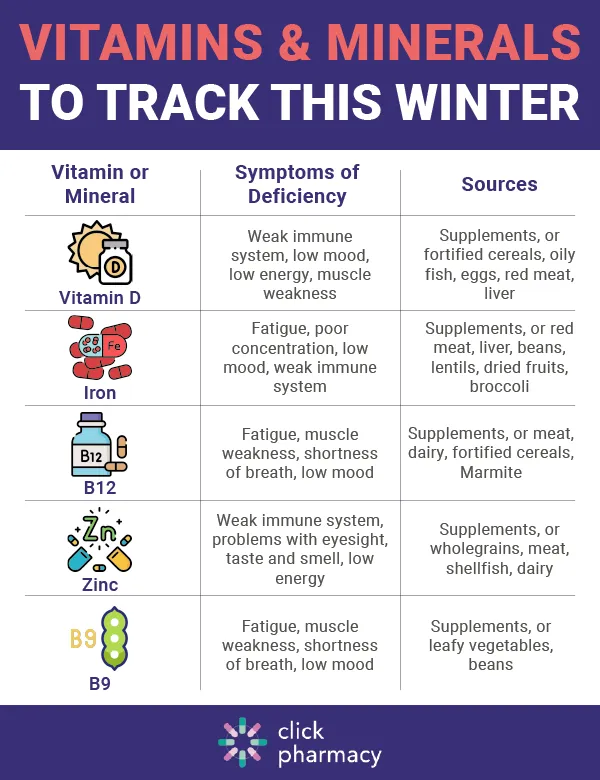
Authored by Jana Abelovska - GPhC-Registered Pharmacist
08-01-2025
Winter is a time of year when many of us just feel a little bit worse - with the cold weather and short days, it’s common for people to say they feel low in motivation, or have low mood or less energy around this time. But these are all symptoms of common deficiencies, so for some people it could be that low levels of an important vitamin or mineral are causing these issues. Here at Click Pharmacy, we’ve put together a list of vitamins and minerals to be aware of this winter, including ones that might help prevent common winter ailments like cold and flu.

Vitamin D
This is the most well-known vitamin to be aware of in winter, for good reason. Our bodies make vitamin D when we are exposed to sunlight, meaning that many people’s levels of this important vitamin drop as the seasons change. The UK government advises everyone to consider taking a vitamin D supplement in autumn and winter - government data revealed in 2022 that nearly 1 in 6 adults in the country are deficient in this essential vitamin, along with almost 20% of children.
Having insufficient levels of vitamin D puts children at risk of rickets, and can lead to bone pain and muscle weakness in adults. Some studies have also suggested that vitamin D might be able to help protect against joint pain, as well as boosting our immune systems. Vitamin D deficiencies can include muscle weakness, tiredness and low mood.
Vitamin D deficiency is also associated with Seasonal Affective Disorder, a type of depression that comes and goes in a seasonal pattern, with many people who are affected by it feeling worse in the winter. Some people with SAD have been found to have lower levels of vitamin D. While more research is needed to discover whether vitamin D supplements can help improve people’s symptoms of SAD, low levels of the vitamin should still always be treated.
Most doctors recommend taking vitamin D3 because it is the most effective form. The NHS advises taking 10mg daily, and warns that over 100mg will be too much and could be harmful.
As well as taking supplements, there are a few foods that can boost your vitamin D levels - namely oily fish, eggs, red meat and liver. If you don’t eat meat or dairy products, some foods are fortified with vitamin D, such as spreads and breakfast cereals.
Iron
Symptoms of low iron levels include fatigue, poor concentration, low mood and a weaker immune system - all of which could be mistaken for a response to cold winter weather.
Iron deficiency can lead to anaemia, a condition in which your body does not produce enough red blood cells or in which your red blood cells don’t work properly. Symptoms can include cold hands and feet and looking more pale than usual, which could also go overlooked in winter. Iron deficiency anaemia can also cause heart palpitations, headaches, shortness of breath and less common symptoms like hair loss, tinnitus and mouth ulcers.
Iron deficiency anaemia affects an estimated 3% of men and 8% of women overall in the UK. However, premenopausal women are at greater risk of iron deficiency due to menstruation, with an estimated 12% of all premenopausal women having low levels of iron, along with more than a fifth of pregnant women in the UK, at 23%.
Good sources of iron include red meat, as well as liver, although pregnant women should avoid this kind of organ meat. Beans and lentils are a great vegetarian source of iron, as are nuts and dried fruits. Leafy vegetables like broccoli are rich in iron, too. The NHS says that most people should be able to get enough iron from their diet, and says 17mg of iron supplements or less will be a suitable dose, unless your doctor advises otherwise.
B12 and B9
Low levels of B12 or B9, also known as folate, can cause vitamin B12 or folate deficiency anaemia - when your body creates abnormally large red blood cells that don’t function as they should. Symptoms of this deficiency include fatigue and lack of energy, muscle weakness, pins and needles, vision problems, and mouth ulcers. It can also cause or worsen psychological symptoms including anxiety, depression, confusion or even dementia, as it can also cause cognitive issues with memory and understanding.
Symptoms like fatigue and low mood might easily be mistaken for ‘winter blues’ but as you can see, being deficient in B12 or B9 is quite dangerous. The link to anxiety and depression has implications for people who already suffer from SAD, as in the winter they are already vulnerable.
Some groups of people are more at risk than others of B12 or folate deficiency - around 1 in 10 people over the age of 75 and 1 in 20 people aged between 65 and 74 have low levels of these essential B vitamins.
People who follow a vegan or plant-based diet are also at extra risk of B12 deficiency at all times of year, as B12 is most commonly found in fish, meat, eggs and dairy. Vegan sources of B12 include breakfast cereals and milk alternatives that have been fortified with the vitamin, as well as Marmite and nutritional yeast - but people who follow this diet are advised to take B12 supplements too. People whose levels of B12 are dangerously low are often treated with B12 injections.
Folate is found in leafy green vegetables including broccoli, sprouts, cabbage and kale, as well as chickpeas and kidney beans. Folate deficiency is generally treated with a course of folic acid tablets, which are also recommended for pregnant women or women who are trying for a baby, as folate deficiency can cause birth defects.
Zinc
Zinc deficiency is known to weaken the immune system, making people more susceptible to infections such as colds and flu which spread more easily during the winter. Zinc helps prevent both bacterial and viral infections. Some studies have even suggested that zinc supplementation might help shorten the duration of the common cold, although more research is needed.
Low levels of this mineral can also cause worrying symptoms like lack of energy, and problems with eyesight, taste and smell. It’s especially dangerous for children to be affected by zinc deficiency as it can affect their growth and their cognitive development.
This mineral is commonly included in multivitamins but also available as a separate supplement. The NHS advises that you shouldn’t take more than 25 mg zinc supplements daily, unless told to by your doctor.
Zinc can be found in whole grains including wheat, oats, brown rice and quinoa, meaning that wholemeal bread can be a good source. Meat, shellfish and dairy are also rich in zinc.
Bonus winter supplements
Outside of these key vitamins and minerals, there are also a number of supplements which might be able to boost your health this winter. Black elderberry has been shown in some studies to help reduce upper respiratory infection symptoms - a type of illness that’s much more likely to strike in winter. Probiotics might also be able to help protect you against coming down with respiratory infections like the common cold and flu in the first place, according to some research.
Conclusion
This winter, if you are feeling more tired than usual, experiencing low mood, or have any other symptoms that are concerning you, speak to your doctor. It could be that a vitamin or mineral deficiency is behind your symptoms. Your doctor might recommend a blood test, especially if you belong to a category that might experience an increased risk of vitamin deficiencies, such as older people, pregnant women, vegans and vegetarians, or people with certain medical conditions.
If you decide to begin using a new supplement, ask a medical professional first, as supplements might interact with a medication you are using, and taking a dose that is too high of any supplement can cause problems.
Sources
https://www.ncbi.nlm.nih.gov/books/NBK232871/